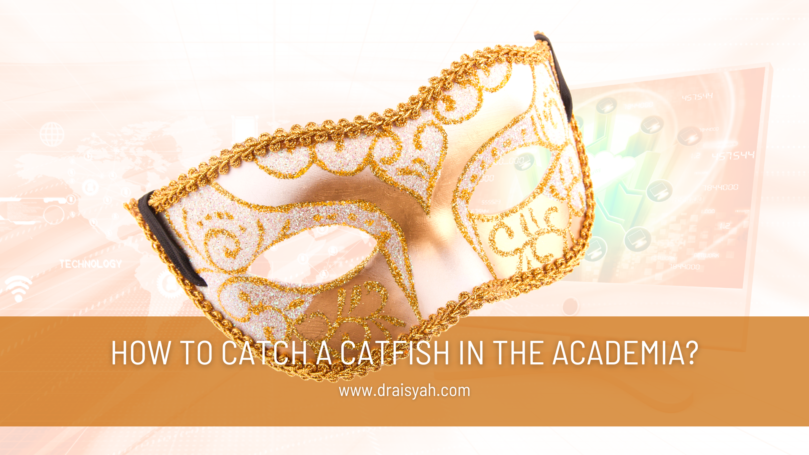Over a morning coffee, I came across an article about ‘catfishing‘. Though I love ikan keli, afraid it’s not about the fish. These days, catfishing means using a fictional persona to cultivate online presence, especially on social media, for deceptive purposes.
Apparently cases of catfishing of athletes in the States have been reported. Only this time, the story comes with a little twist.
The catfishing incidents happened to academicians whose niche areas are in body arts or tattoos. A student assumed their identities, stole their work and writing on social media. You can read more on the story in the link below:
A Student Stole My Academic Work, Copied My Tattoos and Gave Talks Pretending To Be Me by Dr. Matt Lodder, University of Essex, UK.
‘Horror stories’ about Intellectual work
I’ve heard too many ‘horror’ stories about intellectual work being ‘stolen’ in academia, industry and businesses.
Teaching videos in certain online platforms were taken down and then put up on another similar platforms–without the consent or under licensed by the creators.
A keynote presentation was shared with the organising committee since it was requested by participants. The presentation ended up as an academic book. Only that the presenter discovered that he was not an author of the book.
Contents of rejected grants were ‘recycled’ under other academicians. The recycled grants were successful.
And many more stories…
One of the most valuable lessons I learned working in academia is to protect one’s intellectual work. Be it a simple video, a keynote presentation or in this above case, unpublished work.
Yet cultivating one’s fake academic persona is an entirely whole new level.
Catfishing using Intellectual Work and Identity
Building one’s persona in the online world is helpful in the 21st century. It’s helpful when promoting one’s research. Many platforms e.g. Publons, ORCID and Scorpus assign a researcher’s identity code that links one’s lifetime work in the academia. Publication, peer-review and editorial work in one place. Similar to a digital CV.
These IDs can be easily shared–and may assist a researcher in getting his/her work recognised and for building reputation and network with other academics. Definitely helps in academic promotions.
Sharing work–published or unpublished–on social media is also a trend nowadays. It’s good for exposure and to educate the public about our research. But when they fall into the wrong hands (and minds), it can get as bizarre as the story above.
Intellectual work – why protect it?
Apart from getting recognised or building reputations, many academics share their thoughts and work with others in the acts of good faith. It’s a good feeling when someone share our interests and passions in a niche area.
And with the hope that the other person(s) would respect the time and effort that went into the work. In return, the very least that one can do when using someone’s work is to give credit. Cite the name of the author or researcher or presenter. Mention it in your publication, book or presentation.
It’s about reciprocity, goodwill, respect and integrity.
I realised, however, some people lack the capacity of doing good honest work. They prefer to use other people’s work and have the audacity of posing them as their own – without giving due credits.
The word ‘prefer’ is to denote that it’s a choice all the way through, and not a mistake.
Protect your intellectual work–Catfish or not
To academics, don’t take it lightly about protecting your own work, published or unpublished. Many universities offer workshops or seminars on intellectual properties. Yes, legal stuff can get a little dry but those ‘boring’ stuff will help you in the long run.
Check out my blog post below if you want to get acquainted with many ways on copyright issues and the terms of use of one’s intellectual work and read my experiences registering a copyright with MyIPO.
With the increasing use of online learning and assessment during the Covid-19 pandemic and lockdowns, assuming an online persona is super easy. The question is what measures are being formulated or in place to ensure that the person taking online exams is the real student?…
Without any measures in place, catching one ‘catfish’ would be more difficult… Catfishing could pose a major headache (and heartaches) for many lecturers and administrators.
The story of academic catfish above could serve as an important reminder and perhaps a snapshot of what could happen in the near future…
I think there should be more awareness or education on the ethics and proper use of social media and cybersecurity in the higher education for personal and professional use. How to deal with catfish situations for academics and students?… What are a university’s policies for ‘catfishers’?
So how to catch a catfish in the academia?
Do you have any ideas, tips or comments to deal with such situation?… What are the red flags? Share in the comment section. Till then, stay safe!


